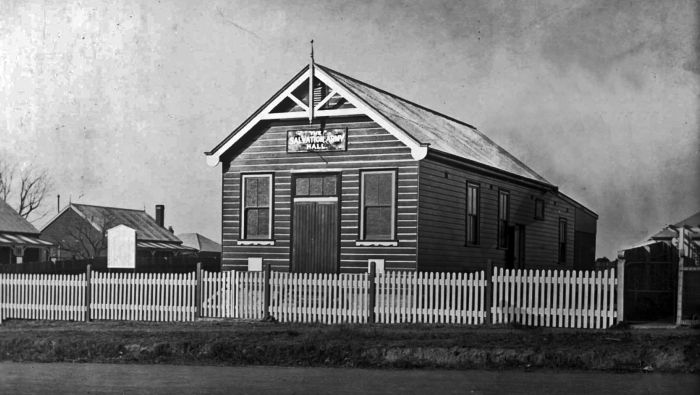Our History
“Therefore He is able also to save forever (completely, perfectly, for eternity) those who come to God through Him, since He always lives to intercede and intervene on their behalf [with God].”Hebrews 7:25
Powered by BibleGateway.com
We are called to provide a gateway to new life through Christ-centred worship, continued spiritual growth and service to the community.

The Shire of Hornsby, on the north-west outskirts of Sydney, was semi-rural until well into the 1940s. Predominantly working class, its expansion and development from 1890 occurred as a result of the railway junction at Hornsby itself. An outpost of the Ryde Corps of The Salvation Army existed at Hornsby from the 1890s and its official beginning as a corps (church) in 1921 led to a long, unbroken period of service. The work of the Army in this region, typical of other centres of service, has been marked by its outreach to the community, its work with young people, the service given by single women officers, and particularly by the Hornsby Corps' longevity. Because Hornsby has continued as a growth area since the 1890s, the Army has remained there to witness for Christ and serve the community both within the corps and outside it.
Captain Mary Anne Smith was appointed to Ryde in January 1894, and set to work straight away, taking in all the district with the War Cry, selling and visiting, and driving out with the Lieutenant to the outpost Hornsby. Records are not available to tell if the Hornsby outpost was established prior to 1894, but it is more than likely that the outreach dates from the late 1880s as Hornsby began its expansion in 1886 and Ryde Corps, opened in September 1887, was served by a succession of officers from that time.
In the “Boomers Gallery” of the War Cry for 23 June 1900, we find reference to Sister Annie Deagon of Hornsby (Ryde Outpost), a lassie who sold the War Cry in hotels throughout her life of service in the Army. Over 50 years later in 1959, another “boomer” was reaching out to the hotel clientele in Pennant Hills, part of Hornsby Shire. Captain Jean Reid was a young single officer at Thornleigh, down the road from Pennant Hills. Friday night would see Captain Jean at the hotel, handing out the War Cryand taking up a collection from those willing to donate.
A house is built
On 20 August 1921, a modest building on the corner of Hunter and Burdett Streets was opened by Commissioner James Hay. There was now an official base for the work of The Salvation Army, work which had been visible in the area for the previous 30 years. Captain Fred Eldridge and Mrs Eldridge were appointed to take charge, and one week later Mrs Eldridge held the first meeting of the Home League. They were wonderful workers, those League women, Mrs Eldridge was to say later. She remembered the way the women both gave and worked, raising money at each “Fair” held in the neighbourhood. Captain and Mrs Eldridge were to move on in January 1923.
On 27 November 1965, a new Salvation Army Citadel was dedicated on the same site, with another new building being opened at 29-31 Burdett Street in March 1989.
A role model for women
The Hornsby Corps and its branch at Thornleigh have been served by many dedicated women, as well as by its male officers. Captain Jean Venables was the single officer in charge at Hornsby from January 1962 until June 1964 and her assistant was Lieutenant Jessie Rablin.
I thank God for the fact that The Salvation Army opened up the way for female ministry, not only for married women as assistants to their husbands, but also to single women whereby they can spend a lifetime in officership, Major Jean Venables said in 1978.
Started in the years of the Second World War, Thornleigh Corps was to be served by 16 single women officers before being closed in the early 1980s. Captain Jessie Stewart, assisted by Lieutenant Jessie Rablin, served at Thornleigh from January 1955 to June 1956.
Unto the least of these my children (Matt. 25:40)
Hornsby has special needs, says Val Saunders of the Hornsby Corps. There are a lot of mental health problems because of the patients attending Hornsby Hospital's psychiatric unit, and people on disability pensions – most of them come here – food supplies, furniture, clothing, vouchers for doctor's prescriptions, and most of them come alone. There are also the low-income earners with or without families, and the rents are high in the high rise units, really too high for low-income workers or pensioners.
The Community Service Centre in Burdett Street, Hornsby, offers help with material aid (food, clothing, furniture), referrals for rehabilitation (drugs and alcohol) and family counselling. There is a family store on the Burdett Street premises for the purchase of cheap clothing and household items. Emergency services help in time of crisis such as bushfires, train accidents, storm damage.
Hornsby has continued as a growth area since 1890 and the Army has been faithful there, even before its official beginning in 1921, witnessing for Christ and serving the community both within the corps and outside it.
